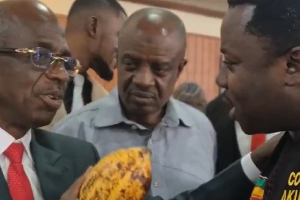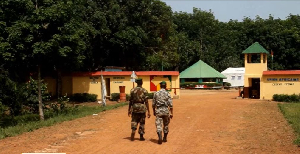Petition to Amend the Constitution of Ghana, 1992 (Articles 94(2)(a) and 8(2))
and the Citizenship Act, 2000 (Act 591, Section 16(2))
Professor Stephen Kwaku Asare
This is a petition to amend the Constitution of Ghana by repealing Articles 94(2)(a)
and 8(2) of the Constitution. It also proposes the repealing of Section 16(2) of the
Citizenship Act, 2000 (Act 591). Article 94(2)(a) provides that “A person shall not
be qualified to be a member of Parliament if he owes allegiance to a country other
than Ghana.” Article 8(2) of the Constitution and Section 16(2) of the Citizenship
Act exclude dual citizens from holding various specified and unspecified public
offices and give Parliament and the minister the power to add more office-holding
exclusions.
These exclusions create a class of citizens who cannot serve in Parliament, the
Supreme Court or as ministers in the Executive branch. Thus, the exclusions have the
effect of creating sub-citizens, quarantined from serving in the organs of
government, and are antithetical to the structure and spirit of the Constitution, which
strives for equal citizenship and rejects a caste system.
A substantial majority of dual citizens are citizens of Ghana by birth who have
subsequently acquired the citizenships of other countries. They acquire these other
citizenships for a variety of reasons, including marriage, residence, political asylum
(especially in the military era) and economics.
Regardless of why they have acquired these other citizenships, they have complete,
total and unwavering loyalty, fidelity and allegiance to our beloved country and have
amply demonstrated, through their continued involvement in our socio-political life,
their commitment to joining hands with their brethren to work towards building a
prosperous country for our posterity.
Most of these dual citizens have been educated at the country’s secondary schools
and universities at great cost to the nation. They have considerable knowledge of the
country’s history and institutions. They are an important part of the human capital of
this country. Our country is not well served by denying these citizens the opportunity
to serve in Parliament, on the Supreme Court and as ministers in the Executive
branch and in other specified offices.
It appears concerns about the “fidelity and loyalty” of dual citizens underly the
regime of exclusions (in Articles 94(2)(a), 8(2) and Act 591) and dangerous drift
towards a segregated society. As the Attorney-General has recently stated to the
Supreme Court, “How can the loyalty of say a Colonel in the Ghanaian Army be
guaranteed if there is a war between Ghana and Nigeria and the said Colonel holds
both citizenship of Ghana and Nigeria? How can one be sure of the commitment and
loyalty of Ghanaian High Commissioner to UK if there is a diplomatic row between
Ghana and UK when the same Ghanaian High Commissioner holds a British
citizenship as well?”
Yet, when the Attorney-General was challenged to provide empirical evidence to
justify the concerns about loyalty and fidelity, he was not able to name even one dual
citizen who had betrayed or attempted to betray the country. Appropriately, our
nation has not allowed concerns about loyalty and fidelity to stand in the way of
fielding dual citizens like Kevin Prince Boateng and Abedi Ayew in the Black Stars,
even though the game of soccer, with only 11 players, present better opportunities
for “sabotage” than that of legislating, where an MP is one of 230. It is also difficult
to fathom why a Ghanaian born citizen who has acquired the citizenship of another
country cannot be employed as the Chief Fire Officer, Commissioner (Value Added
Tax Service) or the Chief Director of a Ministry.
If anyone should be concerned about the loyalty of say a Ghanaian born dual citizen
Colonel in the Ghanaian Army, in the unlikely event of a war between Ghana and
Nigeria, should it not be Nigeria? What, in our national psychology, allows us to
doubt the loyalty and fidelity of our own brethren who grew up on our streets,
attended our schools, own property in the country, contribute to the national
economy and take care of our parents, merely because they have also acquired the
citizenship of another country? Why can a Ghanaian citizen who has subsequently
acquired the citizenship of Britain be an MP in Britain but not in Ghana? If the
British have no concerns about the fidelity and loyalty of a Ghanaian by birth who
has only recently acquired British citizenship, why should we have doubts about this
son of the land?
Fortunately, there is evidence to suggest that the concern about loyalty and fidelity is
not widely felt. Recent field evidence shows that an overwhelming majority (in
excess of 60%) of Ghanaians believe that dual citizens should not be disqualified
from serving as MPs or as ministers.
While the Supreme Court recently upheld some of the exclusions, it did so without
endorsing the Republic’s concerns about the fidelity and loyalty of dual citizens. In
fact, the Supreme Court described as “cogent,” the plaintiff’s dismantling of the
Republic’s concerns about fidelity and loyalty. Nevertheless, the Court upheld some
of the exclusions, noting that “bad and unsound legislative policy is not necessarily
unconstitutional.” Further, the Supreme Court struck down Section 16(2)(m) of Act
591 as unconstitutional, in that Parliament unlawfully delegated its powers to the
minister. While it may not be the province of the Supreme Court to pronounce laws,
based on bad and unsound policy, as unconstitutional, there is no sound reason to
exclude a significant portion of our human capital from our governance and
developmental activities based on bad and unsound policy.
One member of the Supreme Court (Justice Sophia Akuffo) reiterated that
Citizenship connotes the enjoyment of a bundle of rights, which can be curtailed by
following clear legal provisions. She reasoned that the power given to Parliament to
add to the list of public office holding exclusions under Act 527 is an unlawful
hijacking of the process for amending the Constitution. Further, when Parliament
excluded dual citizens from holding additional offices under Act 591, Parliament
unlawfully amended Article 8(2) of the Constitution. Accordingly, she held that
Article 8(2)(g) was unlawfully inserted into the Constitution and is unconstitutional.
She also held that Act 591, Sections 16(2)(a), (h) – (l) was unconstitutional (these are
the additional offices proscribed by Parliament in 2000). In her words, “to hold
otherwise would be very dangerous and make a mockery of constitutional provisions
such as Article 8(2), which particularized specific matters, thereby eventually
reducing the Constitution to the status of an ordinary statute, as evidenced by what
Parliament has attempted to do in section 16(2) of Act 527.”
Some have suggested that dual citizenships renounce their other citizenships as a
condition precedent to holding the excluded public offices, even if the exclusions are
based on unsound and bad policy. The suggestions that dual citizens renounce their
other citizenships as a condition to hold the specified public offices is unduly harsh,
unreasonable and serves no legitimate purpose. These offices are elective or
appointive and the electors and appointors can properly incorporate any effect of
dual citizenship in their voting and appointing decisions. That is, why not let the
voters and appointors decide whether they want to elect a dual citizen as an MP or
appoint same as the Chief Fire Officer?
The exclusions are also irrational because dual citizens have served and can serve at
the office of the Presidency, including serving as Chief of Staff and deputy Chief of
Staff. If dual citizens can serve as Chief of Staff of the President, which arguably is
one of the most powerful positions in the country, then it is unfathomable and
irrational to exclude them from serving in positions, such as a Chief Fire Officer or
as Members of Parliament.
Further, the requirement that dual citizens renounce their other citizenships is
discriminatory, disproportional and devalues their dignity. It is discriminatory
because it requires dual citizens to give up their ability to travel to their other
countries while single citizens who are permanent residents (of other countries) do
not give up this ability when they opt to serve the country. That is, renouncing their
citizenships, as a condition precedent to serving, forces dual citizens to give up their
residence as well, while single citizens are not similarly required to give up their
residence. It is also discriminatory in treating dual citizens differently from single
citizens who are ordinarily resident in Ghana.
The current regime of exclusions is an affront on the dignity of dual citizens. The
exclusionary regime questions their patriotism, integrity and citizenship, premised
solely upon their circumstances without considering their individual capacities or
merits. The exclusions violate their human dignity by marginalizing, ignoring, and
devaluing them. The exclusions impose harsh sanctions on them without any
evidence of wrongdoing, save a mere and unfounded suspicion that they lack total
loyalty and fidelity. Yet, there is not a single dual citizen who has been found to be
disloyal to the country while there are many instances of single citizens
overthrowing the constitution (treason) or leaking sensitive information to various
embassies, as recently revealed by the wikileaks files.
Dual citizens, as citizens of this country, have interests and have a fundamental right
to fully engage in the political process, including the ability to serve in all elected
and appointed public offices.
Dual citizens and Ghanaians in the diaspora support the national economy with their
remittances. In 2010, remittances or private unrequited transfers (net) in the year
amounted to $2.12 billion. This evidences their loyalty and commitment to the
country. In the history of the 4th Republic and the country, there is not a single case,
where a dual citizen has been found to disloyal, infidel or otherwise harm the interest
of the country as a result of their dual citizenship. On the other hand, many dual
citizens played an active role in creating the conditions that led to the establishment
of the 4th Republic.
Our country is at its best when we allow all our citizens to be full and equal citizens.
This is what defined us in South Africa, when the Black Stars dazzled the world with
its brand of soccer. This is the spirit that led to the selection of Prince Kevin
Boateng, a dual citizen, born in Germany to Ghanaian parents, to play against the
Germany national team. Neither his loyalty nor his fidelity was questioned even
though the short-duration, fast-paced, and lack of controls in a soccer game,
exarcebate any concerns about loyalty and fidelity.
In the rest of the petition (available upon request from the author), we provide
constitutional and statutory background, followed by an articulation of the equal
citizenship principle. We then present the case for why the exclusions are inconsistent
with our constitutional values. Draft bills are attached in Schedule 1.
Petitioned:
The Speaker of Parliament
All Members of Parliament
His Excellency the President
His Excellency the Vice-President
Chairman of NDC, NPP, CPP, PNC and PPP
All Presidential Candidates for 2012 general election
cc: Media
Opinions of Saturday, 23 June 2012
Columnist: Asare, Kwaku S.














